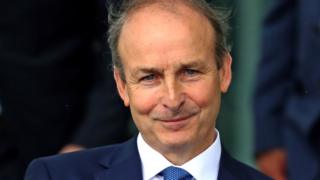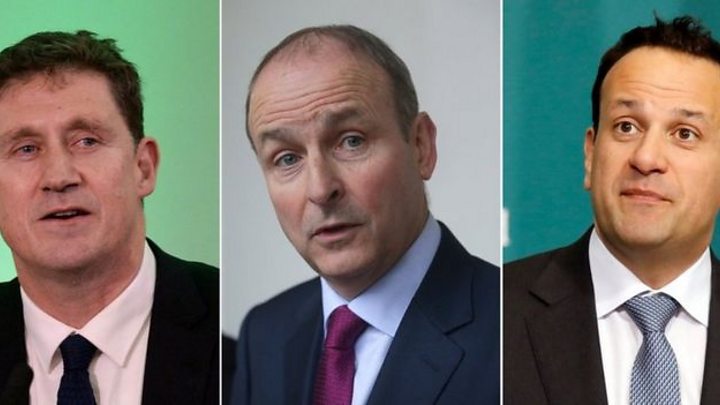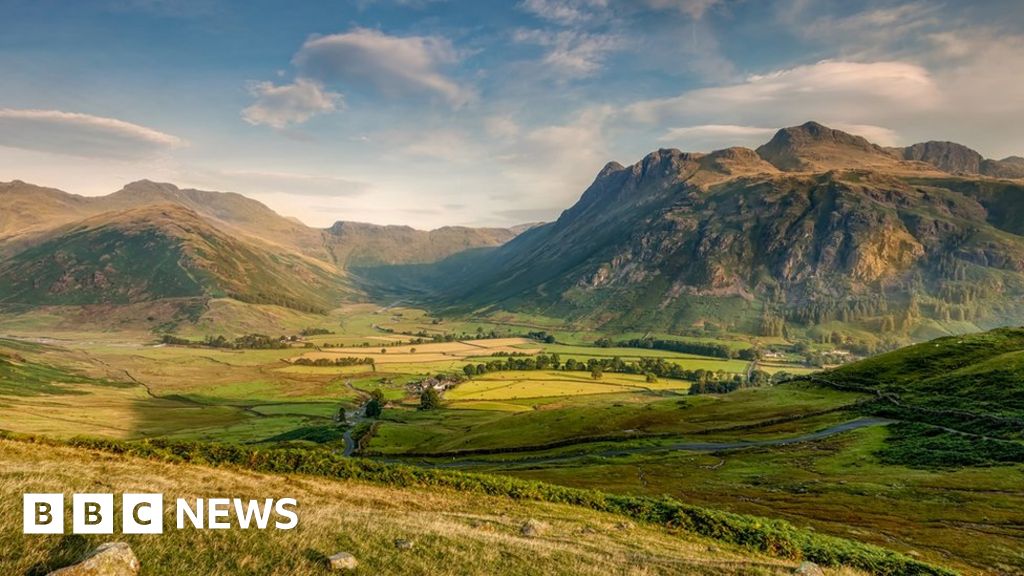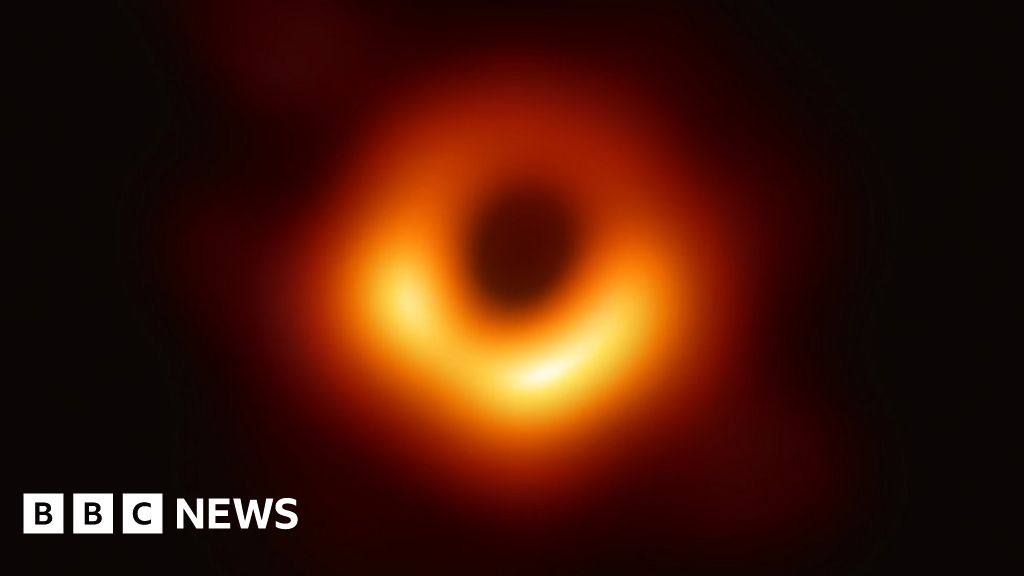 Image copyright
PA Media
Image caption
Micheál Martin will lead his Fianna Fáil party into a historic coalition with Fine Gael and the Greens
Image copyright
PA Media
Image caption
Micheál Martin will lead his Fianna Fáil party into a historic coalition with Fine Gael and the Greens
Ireland's new taoiseach (Irish prime minister) Micheál Martin has said the fight against Covid-19 will be his government's first priority.
The 59-year-old Cork native was elected at a special meeting of the Irish parliament in Dublin.
He has been the leader of the Fianna Fáil party since 2011.
He will lead a three-party coalition consisting of Fianna Fáil, Fine Gael and the Green Party.
Mr Martin said that to be elected to serve as taoiseach was "one of the greatest honours which anyone can receive".
Speaking to the Dáil (Irish lower house) as taoiseach for the first time, Mr Martin said the focus would be on the social, economic, and cultural recovery from the coronavirus.
He said would would begin immediately on preparing an investment-led jobs and recovery initiative.
These proposals would be brought before the Dáil next month.
It is the first time in history that former Civil War rivals Fianna Fáil and Fine Gael have governed together.
Mr Martin is expected to lead the country until December 2022 before handing back over to Leo Varadkar, the Fine Gael leader.
Image copyright EPA Image caption Micheál Martin pictured leaving Dublin's Convention Centre after being electedMr Martin has been a member of the Dáil (lower house of Irish parliament) for just over 30 years.
He served as cabinet minister in several Fianna Fáil governments from 1997 to 2011.
As health minister in 2004, he became the first national government minister in any part of the world to introduce a workplace smoking ban, which also banned the public from lighting up in pubs.
Mr Martin was elected taoiseach by members of the Dáil in a special sitting on Saturday.
The vote took place at the Convention Centre in Dublin, rather than its traditional home at Leinster House, due to Covid-19 social distancing rules.
Image copyright PA Media Image caption TDs gathered at the convention centre in Dublin, due to social distancing requirementsA majority of 93 members of the Dáil voted in favour of him taking the role, while 63 members voted against him.
Image copyright EPA Image caption Mr Martin made the trip to the president's official residence, Áras an Uachtaráin to be presented with the seal of officeMr Martin appointed a new cabinet on Saturday evening, dividing the roles between all three parties.
Fine Gael leader Leo Varadkar is now the tánaiste (deputy PM) as well as minister for enterprise, trade and employment.
Writing on Twitter on Saturday evening, he said he was "honoured" to be appointed to the position, and that his party was "doing what is right for the country".
Green Party leader Eamon Ryan is minister for transport, energy and climate action.
The rest of the posts were distributed as follows:
Minister for Finance - Paschal Donohoe (Fine Gael) Minister for Health - Stephen Donnelly (Fianna Fáil) Minister for Foreign Affairs and Defence - Simon Coveney (Fine Gael) Minister for Justice - Helen McEntee Fine Gael) Minister for Education - Norma Foley (Fianna Fáil) Minister for Agriculture - Barry Cowen (Fianna Fáil) Minister for Housing - Darragh O'Brien (Fianna Fáil) Minister for Public Expenditure - Michael McGrath (Fianna Fáil) Minister for Rural Affairs and Social Protection - Heather Humphreys (Fine Gael) Minister for Higher Education - Simon Harris (Fine Gael) Minister for Communications and Culture - Catherine Martin (Green Party) Minister for Children and Disability and Equality - Roderic O'Gorman (Green Party)Mr Varadkar has been caretaker taoiseach since the general election in February.
Image copyright PA Media Image caption Higher Education Minister Simon Harris (centre left), remains in the cabinet, having previously served as health ministerNo party came close to winning a majority in the poll which would enable them to govern alone, but coalition talks were then halted by the coronavirus pandemic.
Fianna Fáil won the most seats, but the two larger parties needed the support of the Greens to have a working majority in the Irish parliament (the Dáil).
The party leaders and their negotiating teams reached agreement on a coalition deal earlier this month.

Media playback is unsupported on your device
There have also been nominations made to the Seanad, the upper house of the Irish legislature.
Of the house's 60 seats, the Taoiseach has made 11 nominations, of which there are four each for Fine Gael and Fianna Fáil, with two for the Green Party.
The final nomination goes to Traveller rights activist Eileen Flynn.
Micheál Martin confirmed on Saturday he would be setting up a shared island unit within the Department of the Taoiseach.
This was criticised on Twitter by Sinn Féin MP Chris Hazzard, who highlighted that none of the Seanad picks represented Northern Ireland.
Ian Marshall, a unionist from County Armagh, previously served in the Seanad from 2018 until 2020, and was supported in his original nomination by Sinn Féin.
Analysis: BBC News NI Dublin Correspondent, Shane Harrison
Micheál Martin was the only Fianna Fáil leader in the party's history not to have served as taoiseach, but that changed today.
Image copyright PA Media Image caption Micheál Martin is expected to be taoiseach (prime minister) for two and a half yearsHe will hold the role for 30 months before handing over to Fine Gael leader Leo Varadkar.
The two parties, both centrist, Fianna Fáil slightly to the left and Fine Gael to the right, have dominated the politics of the state since its foundation.
Although there has been little to separate them policy-wise for decades, their decision to share power in government for the first time is historic.
But it's also a political necessity for their leaders to keep Sinn Féin, the party that got the most votes in February's general election, away from government.
Sinn Féin has accused the two of using the Greens as a "fig leaf" to disguise their denial of the electorate's demand for change.
The three parties have five years to disprove those who claim the new coalition is simply a slightly greener version of business as usual in such areas as housing and dealing with climate change in a radical manner.
A meeting between Mr Martin and Northern Ireland's first and deputy first ministers, Arlene Foster and Michelle O'Neill, is likely in the coming days.
While there will be new faces, there will be some old problems to talk about such as Brexit and Covid-19.
Not everyone supported the new taoiseach during Saturday's vote in the Convention Centre.
'Marriage of convenience'
Sinn Féin leader Mary Lou McDonald accused Fianna Fáil and Fine Gael of conspiring to exclude them from government.
Image copyright Oireachtas TV Image caption Mary Lou McDonald claimed Sinn Féin had been excluded from powerAt February's election, Sinn Féin took 24.5% of first-preference votes, compared to 22% for Fianna Fáil and 21% for Fine Gael.
"Faced with the prospect of losing their grip on power, Fianna Fáil and Fine Gael have circled the wagons," she said, claiming the new coalition was a "marriage of convenience".
Fine Gael leader and outgoing taoiseach Leo Varadkar said his party would not make a nomination but instead would support the nomination of Micheál Martin.
Image copyright PA Media Image caption Leo Varadkar and Micheál Martin chat before the vote in the Convention CentreGreen Party leader Eamon Ryan also supported the nomination of Mr Martin for taoiseach, saying the Fianna Fáil leader was "perfectly qualified to run the country".
Labour leader Alan Kelly said his party would not support the nomination of either Mr Martin or Ms McDonald.
People Before Profit Richard Boyd Barrett did not support Mr Martin's nomination and said the coalition's programme for government was a "re-hash and reheating of the same failed policies".

 5 years ago
958
5 years ago
958 

